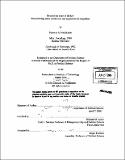Beyond the letter of the law : transforming labor institutions and regulations in Argentina
Author(s)
Natalicchio, Marcela
DownloadFull printable version (20.16Mb)
Other Contributors
Massachusetts Institute of Technology. Dept. of Political Science.
Advisor
Richard M. Locke.
Terms of use
Metadata
Show full item recordAbstract
This dissertation analyzes the factors that lead to the transformation of labor regulations and institutions after the opening of previously closed economies, using the case of Argentina as a "crucial case". In the 1990s, almost every government in the Latin American region attempted to reform its labor code and systems of labor relations. However, despite these attempts at reform, the labor codes and their systems of labor relations appeared resilient to change. The bulk of the literature on the political economy of reforms had concluded that labor unions had managed to stall or derailed these attempts, although unions had been unsuccessful at stopping all other market-oriented reforms. I conceptualized the labor codes and the system of labor relations considering the way they work in practice, including informal arrangements, and I use the notion of "labor regimes". This conceptualization differs from the dominant approach on this issue, which focuses almost exclusively on changes in labor codes approved by Congress. Using this approach, I argue that a system of rigid labor laws and centralized bargaining institutions in a more competitive, pro-business environment tends to get relaxed and more decentralized. (cont.) However, changes do not necessarily occur through modifications in the overall national legal framework. Changes occur through: 1) layers of regulations that overlap with the old system, and 2) new practices of the main stakeholders on the ground that may create new institutional arrangements. In order to understand the direction and scope of these changes, focusing exclusively on the interests of central unions, business associations and the state at federal level will only render a partial explanation at best. Instead, a more societal and micro political approach is required. I argue that how the balance of power between business and labor at the local level plays out, the extent to which the interests of unions and business align at the local level as opposed to the legislative arena, and the characteristics of the previous institutions of industrial relations play a larger role in explaining why and how changes occur.
Description
Thesis (Ph. D.)--Massachusetts Institute of Technology, Dept. of Political Science, 2006. Includes bibliographical references (leaves 260-270).
Date issued
2006Department
Massachusetts Institute of Technology. Department of Political SciencePublisher
Massachusetts Institute of Technology
Keywords
Political Science.